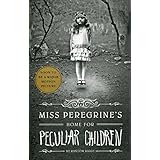This week I am reading Miss Peregrines Home for Peculiar Children ( Riggs) I am about halfway through and can see why it was a NYT best seller. It is peculiar ( especially the characters and the setting) .As I read I want to find out what will happen next and what the conclusion will be.
I 'll want to see the movie and even read the next two. We just got them in the library and I am hoping the students will pick them up after they've seen the movie ad read the first book.

I 'll want to see the movie and even read the next two. We just got them in the library and I am hoping the students will pick them up after they've seen the movie ad read the first book.
